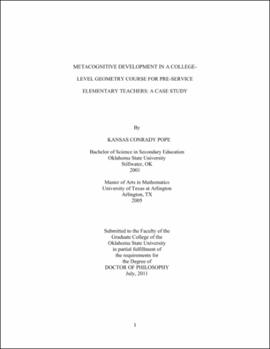| dc.contributor.advisor | Lamphere-Jordan, Patricia | |
| dc.contributor.author | Pope, Kansas Conrady | |
| dc.date.accessioned | 2013-11-26T08:34:49Z | |
| dc.date.available | 2013-11-26T08:34:49Z | |
| dc.date.issued | 2011-07 | |
| dc.identifier.uri | https://hdl.handle.net/11244/7537 | |
| dc.description.abstract | Scope and Method of Study: The purpose of this mixed methods naturalistic inquiry study was to develop a better understanding of how metacognitive development is embedded in an inquiry-based college level geometry content course for pre-service elementary teachers. Data included demographic information, pre- and post- instructor interviews with the one course instructor using an interview guide, pre and post open-ended student surveys with the students from her two sections, non-participant classroom observations of both course sections, documents such as the textbook and course syllabus, and a pre/post administration the Metacognitive Awareness Inventory. | |
| dc.description.abstract | Findings and Conclusions: The analysis of the qualitative data suggests the presence of an underlying classroom structure that promotes the sharing of thinking and importance of class discussions to encourage metacognitive development, but there is a need to help students refine their thinking to make discussions more effective. In this classroom, more metacognitive knowledge is modeled than metacognitive regulation. Students do provide many of the modeling episodes, especially models of procedural knowledge, however; the instructor prompts the students through almost all episodes of modeled conditional knowledge and regulation episodes. Explicit modeling of each subcomponent of metacognition is needed and the development of an effective learning community where students freely share and collaborate would make this classroom more effective at promoting metacognitive development. Due to a delay in the administration of the pre-MAI, it was not possible to determine if the course impacted students' metacognitive awareness. Further exploration of metacognitive development is warranted and ideas for future studies are presented. | |
| dc.format | application/pdf | |
| dc.language | en_US | |
| dc.rights | Copyright is held by the author who has granted the Oklahoma State University Library the non-exclusive right to share this material in its institutional repository. Contact Digital Library Services at lib-dls@okstate.edu or 405-744-9161 for the permission policy on the use, reproduction or distribution of this material. | |
| dc.title | Metacognitive development in a college-level geometry course for pre-service elementary teachers: A case study | |
| dc.contributor.committeeMember | Utley, Juliana | |
| dc.contributor.committeeMember | Thomas, Julie | |
| dc.contributor.committeeMember | Jordan, Jerry | |
| osu.filename | Pope_okstate_0664D_11589.pdf | |
| osu.accesstype | Open Access | |
| dc.type.genre | Dissertation | |
| dc.type.material | Text | |
| dc.subject.keywords | metacognition | |
| dc.subject.keywords | thinking skills | |
| thesis.degree.discipline | Education | |
| thesis.degree.grantor | Oklahoma State University | |
